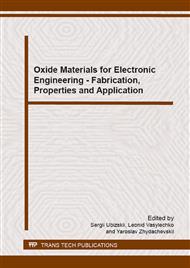[1]
W. Rodejohann, Neutrino-less double beta decay and particle physics, Int. J. Mod. Phys. E 20 (2011) 1833–(1930).
DOI: 10.1142/s0218301311020186
Google Scholar
[2]
J.D. Vergados, H. Ejiri, F. Simkovic, Theory of neutrinoless double-beta decay, Rep. Prog. Phys. 75 (2012) 106301.
DOI: 10.1088/0034-4885/75/10/106301
Google Scholar
[3]
V.I. Tretyak, Yu.G. Zdesenko, Tables of double beta decay b an update, Atomic Data and Nuclear Data Tables 80 (2002) 83-116.
DOI: 10.1006/adnd.2001.0873
Google Scholar
[4]
A. Giuliani, A. Poves, Neutrinoless Double-Beta Decay, Adv. High En. Phys. 2012 (2012) 857016.
Google Scholar
[5]
S.R. Elliott, Recent progress in double beta decay, Mod. Phys. Lett. A 27 (2012) 1230009.
DOI: 10.1142/s0217732312300091
Google Scholar
[6]
O. Cremonesi, M. Pavan, Double Beta Decay Experiments, Adv. High En. Phys. 2014 (2014) 951432.
Google Scholar
[7]
S. Rahaman et al., Q values of the 76Ge and 100Mo double-beta decays, Phys. Lett. B 662 (2008) 111-116.
Google Scholar
[8]
M.E. Wieser, J.R. De Laeter, Absolute isotopic composition of molybdenum and the solar abundances of the p-process nuclides 92, 94Mo, Phys. Rev. C 75 (2007) 055802.
Google Scholar
[9]
V.A. Rodin, A. Faessler, F. Šimkovic, P. Vogel, Assessment of uncertainties in QRPA 0νββ-decay nuclear matrix elements, Nucl. Phys. A 766 (2006) 107-131.
DOI: 10.1016/j.nuclphysa.2005.12.004
Google Scholar
[10]
V.A. Rodin, A. Faessler, F. Šimkovic, P. Vogel, Erratum to: Assessment of uncertainties in QRPA 0νββ-decay nuclear matrix elements, [Nucl. Phys. A 766 (2006) 107], Nucl. Phys. A 793 (2007) 213-215.
DOI: 10.1016/j.nuclphysa.2007.06.014
Google Scholar
[11]
M. Kortelainen, J. Suhonen, Nuclear matrix elements of 0νββ decay with improved short-range correlations, Phys. Rev. C 76 (2007) 024315.
DOI: 10.1063/1.2805109
Google Scholar
[12]
F. Šimkovic, A. Faessler, V. Rodin, P. Vogel, J. Engel, Anatomy of the 0νββ nuclear matrix elements, Phys. Rev. C 77 (2008) 045503.
Google Scholar
[13]
A. Faessler et al., Overconstrained estimates of neutrinoless double beta decay within the QRPA, J. Phys. G 35 (2008) 075104.
DOI: 10.1088/0954-3899/35/7/075104
Google Scholar
[14]
J. Barea, F. Iachello, Neutrinoless double-β decay in the microscopic interacting boson model, Phys. Rev. C 79 (2009) 044301.
DOI: 10.1103/physrevc.79.044301
Google Scholar
[15]
J. Kotila, J. Suhonen, D.S. Delion, Description of the two-neutrino ββ decay of 100Mo by pnMAVA, J. Phys. G 37 (2010) 015101.
DOI: 10.1088/0954-3899/37/1/015101
Google Scholar
[16]
P.K. Rath, R. Chandra, K. Chaturvedi, P.K. Raina, J.G. Hirsch, Uncertainties in nuclear transition matrix elements for neutrinoless ββ decay within the projected-Hartree-Fock-Bogoliubov model, Phys. Rev. C 82 (2010) 064310.
DOI: 10.1103/physrevc.82.064310
Google Scholar
[17]
T.R. Rodríguez, G. Martínez-Pinedo, Energy Density Functional Study of Nuclear Matrix Elements for Neutrinoless ββ Decay, Phys. Rev. Lett. 105 (2010) 252503.
DOI: 10.1103/physrevlett.105.252503
Google Scholar
[18]
M. Tenconi, on behalf of the LUMINEU collaboration, LUMINEU: a pilote scintillating bolometer experiment for neutrinoless double beta decay search, in 13th Int. Conf. on Topics in Astropart. and Underground Phys. TAUP 2013, September 8-13, 2013, Asilomar Conference Grounds, Monterey Peninsula (CA, USA), to be published in the proceedings.
DOI: 10.1016/j.phpro.2014.12.099
Google Scholar
[19]
L. Berge et al., Purification of molybdenum oxide, growth and characterization of medium size zinc molybdate crystals for the LUMINEU program, J. of Instrumentation 9 (2014) P06004.
Google Scholar
[20]
V.B. Mikhailik, H. Kraus, D. Wahl et al., Optical and luminescence studies of ZnMoO4 using vacuum uitraviolet synchrotron radiation, Nucl. Instr. Meth. A 562 (2006) 513-516.
DOI: 10.1016/j.nima.2006.03.005
Google Scholar
[21]
D.A. Spassky, A.N. Vasil'ev, I.A. Kamenskikh et al., Electronic structure and luminescence mechanisms in ZnMoO4 crystals, J. Phys.: Condens. Matter. 23 (2009) 365501.
Google Scholar
[22]
J.L. Gironi, C. Arnaboldi, J.W. Beeman et al., Performance of ZnMoO4 crystal as cryogenic scintillating bolometer to search for double beta decay of molybdenum, J. of Instrumentation 5 (2010) P11007.
DOI: 10.1088/1748-0221/5/11/p11007
Google Scholar
[23]
D.A. Spassky, V.V. Mikhailin, A.E. Savon et al., Low temperature luminescence of ZnMoO4 single crystals grown by low temperature gradient Czochralski technique, Optical Materials 34 (2012) 1804-1810.
DOI: 10.1016/j.optmat.2012.05.007
Google Scholar
[24]
J.W. Beeman, F.A. Danevich, V.Y. Degoda et al., A next-generation neutrinoless double beta decay experiment based on ZnMoO4 scintillating bolometers, Phys. Lett. B 710 (2012) 318.
DOI: 10.1016/j.physletb.2012.03.009
Google Scholar
[25]
J.W. Beeman, et al., Performances of a large mass ZnMoO4 scintillating bolometer for a next generation 0νDBD experiment, Eur. Phys. J. C 72 (2012) 2142.
Google Scholar
[26]
D.M. Chernyak, F.A. Danevich, V. Ya. Degoda et al., Optical, luminescence and thermal properties of radiopure ZnMoO4 crystals used in scintillating bolometers for double beta decay search, Nucl. Instr. Meth. A 729 (2013) 856-863.
DOI: 10.1016/j.nima.2013.07.088
Google Scholar
[27]
A.F. Gumenyuk, V. Ya. Degoda, T.A. Kuchakova, X-ray luminescence and color centers in crystals YAG: Nd3+, Ukr. J. Phys. 31 (1986) 831-836.
Google Scholar
[28]
A. Niklas, W. Jelenski, X-Ray luminescence of YAG: Nd3+, Phys. Stat. Sol. A 77 (1983) 393.
Google Scholar
[29]
F. Seitz, Low temperature luminescence of inorganic solids, Trans. Faraday Soc. 35 (1939) 79.
Google Scholar
[30]
A.F. Gumenjuk, S. Yu. Kutovyi, A method for analysis of complex thermoluminescence peaks: 141 K in LiF as an example, Funct. Mater. 13 (2006) 173-178.
Google Scholar


